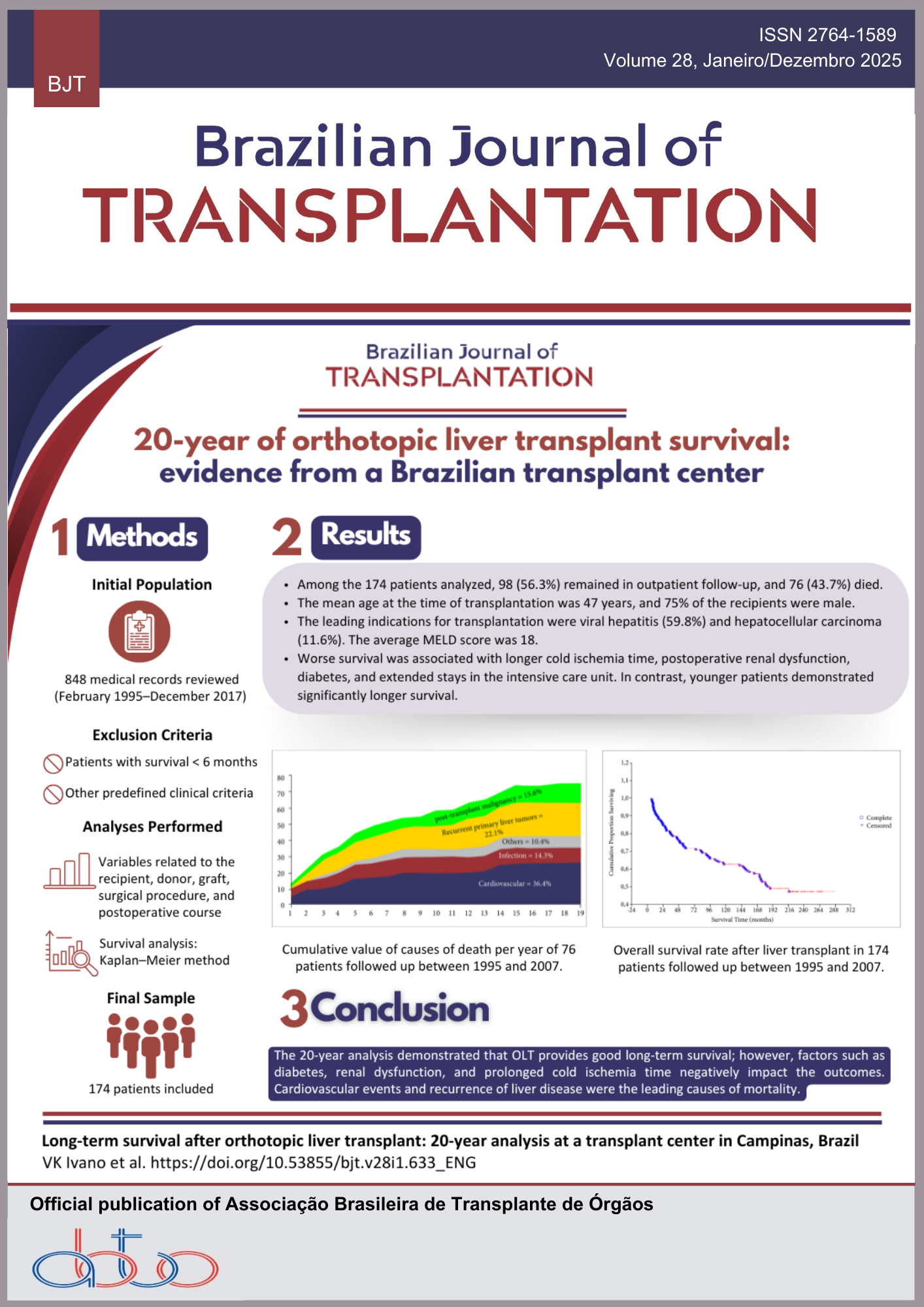Seguridad y eficacia de los antivirales de acción directa en el tratamiento de la hepatitis C en receptores de trasplantes
Palabras clave:
Hepatitis C, Trasplante de Hígado, Tratamiento Biológico, Antivirales de Acción DirectaResumen
Objetivo: realizar un análisis comparativo, evaluando con criterio los perfiles de eficacia y seguridad en una cohorte de receptores de trasplante de hígado y no receptores de trasplante de hígado infectados con hepatitis C y tratados con antivirales de acción directa. Métodos: Este estudio es un análisis observacional retrospectivo de la vida real de personas con hepatitis C crónica que fueron tratadas con antivirales de acción directa. Durante este período, 990 pacientes diagnosticados con hepatitis C recibieron terapia antiviral de acción directa, 165 de los cuales habían sido sometidos a un trasplante de hígado. Los criterios de exclusión incluyeron pacientes VIH positivos y aquellos sin una evaluación de respuesta virológica sostenida. Resultados: La respuesta virológica sostenida fue del 95,8% y 95,6% en receptores y no receptores de trasplante de hígado, respectivamente (p=0,94). La mayoría de los pacientes fueron tratados con sofosbuvir en combinación con daclatasvir, simeprevir y ledipasvir. Se coadministró ribavirina al 43,2% de los pacientes, lo que no produjo ninguna mejora en la respuesta virológica sostenida y sí un aumento de los eventos adversos. El tratamiento de pacientes con genotipo 2 con sofosbuvir y ribavirina y pacientes con genotipo 3 con sofosbuvir, interferón y ribavirina durante sólo 12 semanas mostró una eficacia subóptima (89,5 % y 83,3 %), respectivamente. Conclusión: El tratamiento de la hepatitis C con antivirales de acción directa es tan eficaz y seguro en pacientes trasplantados hepáticos como en pacientes no trasplantados hepáticos, y la prescripción de ribavirina es desaconsejable debido al aumento de eventos adversos graves sin mejoría en la respuesta virológica sostenida.
Descargas
Citas
1. Pawlotsky JM, Negro F, Aghemo A, Berenguer M, Dalgard O, Dusheiko G, et al. EASL recommendations on treatment of hepatitis C: final update of the series. J Hepatol, 2020; 73(5): 1170-1218. https://doi.org/10.1016/j.jhep.2020.08.018
2. Gane EJ, Portmann BC, Naoumov NV, Smith HM, Underhill JA, Donaldson PT, et al. Longterm outcome of hepatitis C infection after liver transplantation. N Engl J Med, 1996; 334: 815-821. https://doi.org/10.1056/nejm199603283341302
3. Garcia JHP, Araujo Filho AH, Braga LLBC, Viana CFG, Rocha TDS, Pereira KB. Pegylated interferon and ribavirin for treatment of recurrent hepatitis C after liver transplantation: a single-liver transplant center experience in Brazil. Arq Gastroenterol, 2015; 52: 216-21. https://doi.org/10.1590/S0004-28032015000300012
4. Burton JR, O’Leary JG, Verna EC, Saxena V, Dodge JL, Stravitz RT, et al. A US multicenter study of hepatitis C treatment of liver transplant recipients with protease-inhibitor triple therapy. J Hepatol, 2014; 61: 508-14. https://doi.org/10.1016/j.jhep.2014.04.037
5. Lobato CMO, Balassiano N, Hyppolito EB, Sanchez-Lermen RLP, Signorelli IV, Nicacio MYT, et al. Effectiveness of firstwave protease inhibitors in hepatitis C virus genotype 1 infection: a multicenter study in Brazil. Rev Soc Bras Med Trop, 2018; 51:14-20. https://doi.org/10.1590/0037-8682-0279-2017
6. Wiesner RH, Sorrell MF, Villamil FG, Balan V, Berenguer MC, Brown, RS. Report of the First International Liver Transplantation Society Expert Panel Consensus Conference on Liver Transplantation and Hepatitis C. Liver Transpl, 2003; 9: S1-9. https://doi.org/10.1053/jlts.2003.50268
7. Berenguer MC. Systematic review of the treatment of established recurrent hepatitis C with pegylated interferon in combination with ribavirin. J Hepatol, 2008; 49: 274-87. https://doi.org/10.1016/j.jhep.2008.05.002
8. D’Ambrosio R, Degasperi E, Colombo MG, Aghemo A. Direct-acting antivirals: the endgame for hepatitis C? Curr Opin Virol, 2017; 24: 31-7. https://doi.org/10.1016/j.coviro.2017.03.017
9. Blach S, Terrault NA, Tacke F, Gamkrelidze I, Craxi A, Tanaka J, et al. Global change in hepatitis C virus prevalence and cascade of care between 2015 and 2020: a modelling study. Lancet Gastroenterol Hepatol 2022; 7(5): 396-415. https://doi.org/10.1016/S2468-1253(21)00472-6
10. World Medical Association. World Medical Association Declaration of Helsinki: ethical principles for medical research involving human subjects. JAMA, 2013; 310(20): 2191-4. https://doi.org/10.1001/jama.2013.281053
11. Abboud OI, Abbud-Filho M, Abdramanov K, Abdulla S, Abraham GP, Abueva AV, et al. The declaration of Istanbul on organ trafficking and transplant tourism. Clin J Am Soc Nephrol, 2008; 3:1227-31. https://doi.org/10.2215/CJN.03320708
12. Forman LM, Lewis JD, Berlin JA, Feldman HI, Lucey MR. The association between hepatitis C infection and survival after orthotopic liver transplantation. Gastroenterology, 2002; 122: 889-6. https://doi.org/10.1053/gast.2002.32418
13. Gane EJ. The natural history of recurrent hepatitis C and what influences this. Liver Transpl, 2008; 14 Suppl 2: S36-S44. https://doi.org/10.1002/lt.21646
14. European Association for the Study of the Liver. EASL Practice Guidelines. EASL recommendations on treatment of hepatitis C: final update of the series. J Hepatol, 2020; 73(5):1170-1218. https://doi.org/10.1016/j.jhep.2020.08.018
15. Lobato C, Codes L, Silva G, Souza A, Coelho H, Pedroso M, et al. Direct antiviral therapy for treatment of hepatitis C: a realworld study from Brazil. Ann Hepatol, 2019;18(6): 849-54. https://doi.org/10.1016/j.aohep.2019.08.001
16. Brasil. Ministério da Saúde. Brasília (DF): MS; 2015.
17. Huang JF, Huang CF, Yeh ML, Dai CY, Yu ML, Chuang WL, et al. Updates in the management and treatment of HCV genotype 3, what are the remaining challenges? Expert Rev Anti Infect Ther, 2018; 16: 907-12. https://doi.org/10.1080/14787210.2018.1544492
18. Brasil. Ministério da Saúde. Protocolo clínico e guia terapêutico da hepatite C e coinfecções. Brasília (DF): MS; 2020.
19. Ayoub WS, Tran TT. Regimens for the hepatitis C treatment-naive patient. Clin Liver Dis, 2015; 19(4): 619-27. https://doi.org/10.1016/j.cld.2015.06.003
20. Silva EU, Batista AD, Lopes EP de A, Filgueira NA, de Carvalho BT, Santos JC, et al. A real-life study on the impact of directacting antivirals in the treatment of chronic hepatitis C in liver transplant recipients at two university centers in Northeastern Brazil. Rev Inst Med trop S Paulo, 2021; 63: e6. https://doi.org/10.1590/S1678-9946202163006
21. Mutimer D. Pre- and post-transplant treatment of viral hepatitis C. Dig Dis, 2017; 35(4): 347-50. https://doi.org/10.1159/000456586
22. Booth IA, Clark JE, LaMattina JC, Barth RN, Haririan A, Ravichandran BR. The impact of treatment delay on hepatitis C liver transplant outcomes. J Pharm Pract, 2023; 36(2): 264-70. https://doi.org/10.1177/08971900211034261
23. Brasil. Ministério da Saúde. Plano de eliminação da hepatite C no Brasil. Brasília (DF): MS; 2018.
Descargas
Publicado
Cómo citar
Número
Sección
Licencia
Derechos de autor 2025 Elodie Bomfim Hyppolito, Roberto da Justa Pires Neto, Larissa Peixoto Teixeira , Lara Martins Sampaio Marques, Vitória Bezerra de Alencar, Karla Brandão Pereira, Lívia Melo Carone Linhares, Antônio Haroldo Araújo Filho, Cyntia Ferreira Gomes Viana, Tarciso Daniel dos Santos Rocha, Clébia Azevedo de Lima, Anderson Fuentes Ferreira, Alberto Novaes Ramos Júnior, José Huygens Parente Garcia

Esta obra está bajo una licencia internacional Creative Commons Atribución 4.0.










